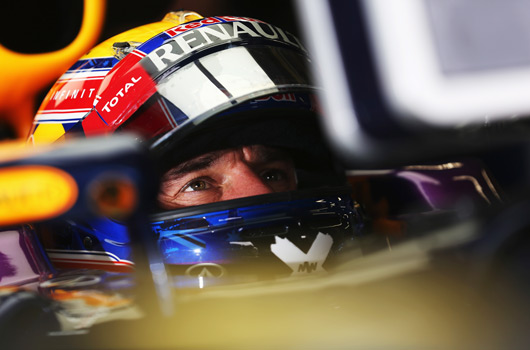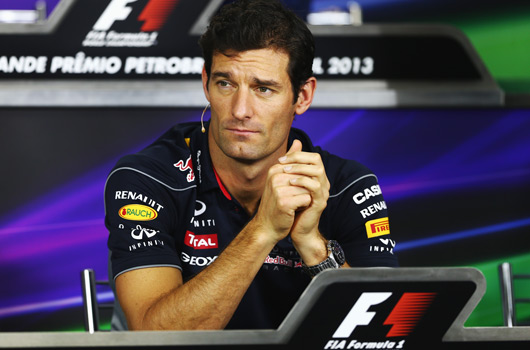In the build up to his 215th and final Formula 1 race Mark Webber has been doing the media rounds. So it’s only fair that his own team got a chance to interview him too.
Red Bull asked Mark to reflect on his first race with Minardi at the 2002 Australian Grand Prix, before concentrating on this morning’s race at Brazil.
Mark is known for his down to earth nature and rarely has that been better illustrated than with this quote:
I would have been very happy growing up and staying in Queanbeyan because I wouldn’t have know any different. But when you start to delve into other areas of life, other places, then it really is a case of ‘wow, this is a ride’. And it was a great ride. You sometimes get more out of that than the actual results.
Read the full interview after the break. And join us as we cross our fingers and wish Mark all the best in his final grand prix, before preparing to give Audi an almighty scare at Le Mans in 2014!
[Pics: Red Bull/Getty Images]
215 and bowing out
November 23, 2013
After a dozen seasons, and so far, nine wins, 32 other podium finishes, 13 pole positions and over 1000 championship points, Mark Webber is about to race in F1 for the final time.
It all seems a long way from the weekend when he made his F1 debut, for Minardi, in 2002. For Mark, though, the memory of his first race and the emotional impact of this weekend’s last grand prix are very vivid indeed, as he told us…
FIRST RACE
Australian Grand Prix, 2002
Minardi
You weren’t confirmed at Minardi until near the start of the 2002 season. How tight was it between being an F1 driver or not?
It was very close. It was just three weeks before Melbourne that I got the news, so that winter hadn’t exactly been super comfortable for me. I was very much looking at not having a drive, which would have meant heading back to Australia for touring cars or something like that. I had a three-race contract; that was all we could manage. But we did Melbourne and things started to change.
So what was it like driving out of the Minardi garage on the Friday for first practice?
It really hits you then, what you’re doing. You have all these engineers around you, all these people working on the car, even at Minardi. It’s suddenly a very big deal. I had it in sportscars to a degree but there you’re sharing with other drivers. F1 is different. This is about you, your situation and about you putting the weekend together. There are all these things you never really thought about before arriving in F1.
It was an eventful race. You rose through the field after a multiple accident at the start but in the latter stages of the race, when you were fifth, you had some mechanical problems. How nerve-wracking were the final laps?
I just wanted the car to finish. I remember [Minardi boss] Paul Stoddard saying before the race “if you just finish the race we’ll be proud” and then he came on the radio and said: “under no circumstances should you let [Mika] Salo past”. He was pushing me hard for fifth and that was the difference between one and two points. Those were real points back then, not like the ones they hand out nowadays. The diff was gone in the car; it was completely broken. But somehow it stayed together. Then Salo arrived on me. That was the thing that surprised me I think. I knew he was coming, I knew he was in a quicker car, the Toyota, but still I was saying to myself, “nah, I’ll be alright. When he arrives on me I’ll just do what I can to keep him behind.” I was pretty composed.
Were you less composed when you go out of the car and saw the reception waiting for you? You were, after all, the first Australian since Alan Jones to score championship points and they even marched you up to the podium to celebrate.
I was overwhelmed by the result. How the hell was that possible? I think I used up all my credits in Melbourne in that first race because I never got on the podium again. I got on the podium every other place in the world but not there. It was incredible.
LAST RACE
Brazilian Grand Prix, 2013
Infiniti Red Bull Racing
It’s always a tough decision for an athlete to leave the top level. Are you still totally comfortable with the choice?
It is a difficult decision for any sportsman or woman to make because it’s against your DNA. Is it putting the white flag up? To a degree it might be. But it basically comes at a time when you just know that there are enough things that you don’t want to do anymore. I used to think about this sport every day and I don’t anymore. But now it’s different. I could continue if I wanted to, of course I could, but I don’t want to test my driving ability and my standards too much at this level. I still think I’m driving well but I don’t want to be around not driving well.
Often with decisions like that – where you announce it and there’s a gap to the end result – it seems like the eventuality becomes unreal, that it will never actually arrive. But it’s here now. So how do you feel about it?
Yeah, it’s here, but I think I’ll be fine until Sunday. That will be a little bit tricky as that will be the last time, the last day at work at this level. It’s a big thing. I’ve got the counsel of a few sportsmen and women I’ve looked up to about it. It certainly isn’t an easy thing to get right. Frank Bruno wasn’t one of the ones I called but I do remember him saying to me years ago that the biggest fight you have is when that day arrives. It certainly was for him. There’s a lot of adrenaline involved in what we do and that isn’t around anymore [when you retire] which is why I’ve got to do something else [the World Endurance Championship]. The results I’ve had in F1 have been great. I never thought I’d get those and I’m very proud of them, but it’s about the journey as well and I’ve had an amazing journey. I would have been very happy growing up and staying in Queanbeyan because I wouldn’t have know any different. But when you start to delve into other areas of life, other places, then it really is a case of ‘wow, this is a ride’. And it was a great ride. You sometimes get more out of that than the actual results.
So, 11 years after you first lined up on the grid in Melbourne, you’re about to start your 215th and final grand prix. So, during that time, what have you learned about racing and about yourself?
Two hundred and fifteen races… it’s a lot. At this level the most important thing is to be flexible. You have to keep learning. It’s the same as at Roland Garros and Wimbledon – those surfaces are largely the same but the playing and winning techniques are constantly changing. As a driver you always have to evolve because if you don’t adapt, you’re dead. I’m trying to get that across to youngsters now, as well. I’ve got one now in Mitch Evans. You have to as many strings to your bow as possible in order to survive. Myself? I’ve been through a lot of emotional phases in my career. Obviously super serious about my profession, which was most of the time, all-encompassing for the people around. But that’s what I believed had to happen at the time because maybe I did not have the most absolute natural flair and talent but I knew that if I grafted and worked hard I’d soon get awesome results. It was a big admission and I needed to do that. But I also smashed a lot of guys who had more talent than me, because they didn’t work as hard as me. They didn’t have the career I’ve had. I learned that about myself. How important it was to graft and just get my head down. I’ve been doing that for most of my career. It starts and stops with the bloke in the mirror, you’re the one that has to do it; no one’s going to give it to you.
Is there any unfinished business in F1?
You’d love to have the experience you have now early in your career but you can’t put an old head on young shoulders.
There’s no career that’s on a rocket ship all the way through. There has to be adversity and testing moments. There have to be wrong decisions; there have to be mistakes. We all make mistakes. You don’t learn too much if you’re never challenged. Some of the races I learned the least in were the ones I won! You often learn more when you don’t get it handed to you, because you want to work out why.
So you’re happy to be coming to end of this track?
Yep, it’s time for a change.
Finally, in one sentence: What Formula One did it mean to you?
Tricky… It was precision. It was the pinnacle.


One reply on “Mark Webber’s first and last”
Here’s another article from Red Bull on Mark’s last day at work.
http://www.infiniti-redbullracing.com/article/last-day-office